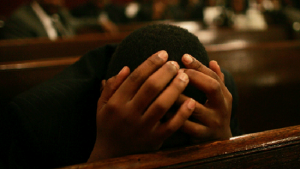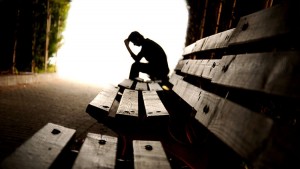Blogger Therese Borchard writes, “A substantial amount of research points to the benefits of faith to mitigate symptoms of depression. In one study, for example, researchers at McLean Hospital in Belmont, Massachusetts, found that belief in God was associated with better treatment outcomes. Of all my sanity tools, my faith is what has kept me alive during severe depressive episodes. When I’m convinced that no one else could comprehend the intense suffering I’m experiencing, I cling to my belief in a God who created me for a reason, who knows my pain more intimately than any other human being, and who will see me through to the other side.” Read the Blog
How Faith Helps Depression
Lack of Meaning in Life Linked to Substance Abuse, Depression
A new study has found that a lack of meaning in life, considered an important dimension of spirituality, is associated with alcohol abuse and drug addiction, as well as anxiety and depression. Read the News
God and Depression
“Does God care about me?”
“Why do I suffer so, Jesus?”
“Please help me, God”
“Where are you? Do you even exist?”
People suffering from depression ask these questions in the silence of their hearts. They cry out to God just as others have for millennia when faced with great sorrow:
“My tears have been my food day and night.” Psalm 42:3.
Beyond therapeutic and psychopharmacological bromides, we all seek loving comfort. Sometimes we get it from others – – sometimes we don’t.
We’ve reached our limit to cope, to keep it all together. We’re worn out by the battle.
We’re searching for answers: “Why me?”we ask. Even when we get answers (e.g. it’s “biochemical” or too much negative thinking) from others, the pain may not abate. And so we ask more existential questions about the nature of our suffering.
Barbara Crafton, an Episcopalian Minister and depression sufferer, writes in her book, When Jesus Wept: When Faith and Depression Meet, about this mystery:
“In several ways, above and beyond the genetics, family upbringing and “slings and arrows” of our existence that has brought us to this point in our lives, there is a real mystery to suffering. Why do some people suffer tremendously while others not so much? Why do some people with a certain makeup come down with depression while someone with a similar history do not? It’s a mystery. Often, while people who get treatment and help come to find out some of the reasons that they’re depressed, it often isn’t enough. The answers don’t always heal us.”
Abraham Lincoln, who struggled with depression his entire life, was quoted in the book Lincoln’s Melancholy: How Depression Challenged a President and Fueled his Greatness:
“I have been driven many times upon my knees by the overwhelming conviction that I had nowhere else to go. My own wisdom and that of all about me seemed insufficient for that day.”
Much like Lincoln, we can feel powerless to stop our depression. It is BIG and we are small. Anything other than the crushing experience of depression feels unreal. We’re not in the normal stream of life that everyone else is swimming in: we’re drowning.
I had never encountered any pain greater than depression. Other types of pain I could deal with and recover from: a burst appendix in college and blown out ligaments in my knee years ago. But depression? There wasn’t any surgery I could have, no caste that could be fitted. I felt like I was dying. In the book Unholy Ghosts: Writers on Depression, writer Susanna Kaysen captures this experience:
“The worst thing about depression – the thing that makes people phobic about it – is that it’s a foretaste of death. It’s a trip to the country of nothingness. Reality loses its substance and becomes ghostly, transparent, unbearable. This perception of what’s outside affects the perception of the self, which explains why depressed people feel they aren’t ‘there.’”
So in the face of so much pain, we look for power outside of ourselves. We place our hope in Someone bigger than our depression – – God.
It’s tough to pray when we’re depressed
Praying when in the throes of depression is a challenge. We might not be able to muster the energy, feel like it isn’t making a dent in our depression; or, worse yet, our faith falters and we stop believing.
We grow despondent.
We give up hope.
We give up on God.
We want salve on our wounds, but depression just keeps throwing salt in them. We yearn so badly for God’s direction (“Show me the way out of this darkness”), but it always doesn’t come.
Barbara Crafton writes:
“It makes every bit of sense for a person to whom faith is a matter of importance – even one who doesn’t think that all human sorrow can be magically prayed out the window – to hope that it will somehow illuminate the darkness of depression. We understand that nobody ever promised us a rose garden, but could we perhaps have a little light?”
Depression is a terrible liar
In a sense, depression is a temptation. It calls us. It whispers in our ear that all is lost and that we’ll never find our way back home. It’s a terrible liar, really. It spins the yarn that we’re worthless and there’s no point in living. And these messages repeat themselves over and over again in our minds and souls. And they all seem so true and unchangeable.
John Piper wrote in When Darkness Will Not Lift: Doing What We Can While We Wait for God – And Joy:
“…We should all fortify ourselves against the dark hours of depression by cultivating a deep distrust of the certainties of despair. Despair is relentless in the certainties of its pessimism. But we have seen again and again, from our own experience and others’, that absolute statements of hopelessness that we make in the dark are notoriously unreliable. Our dark certainties are not sureties.”
Who do You say I am?
One of the most powerful scenes in the Bible is when Jesus turns to Peter and says, “Who do you say I am?”
I like to imagine Jesus standing across from me. He’s looking directly into my eyes. I reach out to Him. and say, “Lord, who do You say I am?” It clearly isn’t what my depression judges me to be. Jesus is always affirming, always loving, always telling us just how precious we are. THAT is the voice we need to listen to and embrace.
A Light in the Darkness
Mother Teresa once wrote:
“If I ever become a saint—I will surely be one of ‘darkness,’” After her death, Many suggest that she suffered from clinical depression and long periods where she sought to understand God’s absence in the face of so much inner pain.
Therese Borchard writes:
“I spent a week with Mother Teresa and her Sisters the winter of 1994. I stood beside her for about two hours as we distributed Christmas gifts to orphaned children. I sensed sadness in her. But her light overshadowed it. Unlike a person wrapped in severe depression, wearing the expression of despair, she exuded light and hope. When she prayed, her deep love for God was visible, even contagious.
This saint of darkness has much to teach me about how to live with inner anguish.
First of all, I should stop referring to my depression and anxiety as the “Black Hole,” (singular and capitalized), and call it, as Mother Teresa described her difficult places, the “dark holes.” Because the darkness is never black, or without any light at all. Her legacy is proof that hope and faith and love prevail, even in the dark night.”
A few years ago, I composed this prayer.
Dear God,
I am on my knees, because I don’t have the strength to stand up.
My strength is gone. I can’t deal with my depression by myself any longer.
I am lonely.
I call on You.
I have faith that Your strength is bigger than my depression,
that Your mercy and healing white light will show me the path home.
I am not alone.
You’re rod and staff comfort me as I walk through the valley of the shadow of depression
and there is nothing I shall fear.
Amen
So don’t lose hope. Don’t lose God. He’s working somewhere in the pain to heal you.
As Pope John Paul, II wrote:
“Do not abandon yourselves to despair. We are the Easter people and hallelujah is our song.”
By Daniel T. Lukasik, Copyright 2015
Seeds of Hope
Reverand, Susan Gregg-Schroeder writes, “I now know that depression affects all aspects of life, including our spiritual well-being. It strikes at our very soul, making us feel cut off from ourselves, from others, and from our understanding of God.” Read the Blog
Losing Faith, Finding Hope: A Journey With Depression
Monica A. Coleman, Ph.D. is an AME minister, seminary professor and author of the book Not Alone: Reflections on Faith in Depression. She blogs on faith and depression at www.monicaaparker.com.
Many people describe depression as a kind of intense grief. It is a deep sadness. It’s like heartbreak, agony and despair all at once. I think depression is worse than grief. Grief usually has an identifiable cause. There are stages. People understand why you are sad. It eases with time.
I find that depression is more like death. In every depressive episode, something is lost. Sometimes it’s the belief that I’m not that sick. Sometimes it’s a dream. Sometimes it’s a concrete plan or goal. Sometimes it’s who I desperately wanted and expected myself to be. Sometimes it’s a harmful lie I’ve told myself, or that someone told me. Sometimes what dies, needed to go. Most times, it seems I would have been perfectly fine without the loss. I would smile more. I would know how I spent the hours in my day. I would see fewer doctors. When people ask me how I am doing, my response of “fine” would only be a lie thirty percent of the time. Like most people, right?
I have lived with a depressive condition since I was a teenager, although I didn’t have a name for it until my 20s. I don’t know how many lows I’ve had — excluding the two suicidal bouts. I don’t count how many times I’ve been sad and desperate for months. I don’t make a list of what I’ve lost.
I do, however, remember when I lost my faith.
Like many people who are raised in a religious environment, I was taught to believe that God loves me and protects me. I was taught that God punishes sin, and rewards those who are faithful. I learned about my religion by studying Holy Scriptures. I prayed. I worshipped. This was supposed to strengthen my faith. It was supposed to make me happy.
For many years, it did. I cherished Sundays spent in church — singing, kneeling and feeling inspired by the words of the preachers. My friends were made up of the other people I met in church. We volunteered at Vacation Bible School for the children, the food drive and tutoring programs.
Meanwhile, I prayed for peace. In my sleepless nights, I asked God to save me, help me and rescue me from my sadness. Just make it all better. I also heard the messages that my faith told me about depression: that I was be too blessed to be stressed; that depression was a lie from “the enemy”; that suicide is an unforgiveable sin. Somewhere between my unanswered prayers and the realization that I could not worship myself into happiness, my faith died.
I kept going to church. I kept saying the words of the prayers. I still sang the songs. I’m a minister — I have to. But I was a fraud. I stopped talking with God. What could I say to the One who was not delivering me? What praise did I have? I could list my blessings, but I could not feel gratitude. I hid my faithlessness like a bobby pin in an updo. Everything looked composed on the outside, but I was barely holding it together. I was not faithful or pious. I felt abandoned and alone.
As my depression worsened, I learned more about it. I read books. I found doctors who understood my condition. I stopped fearing medication. I met other people who struggled like me. We learned to hear sorrow in one “hello,” and how to sit with each other without words. I began to believe that depression was not a personal weakness or failure. By accepting it, I began to manage it. When I felt joy, I appreciated it all the more. I started to trust the healing process. But I missed my faith in God, religion and worshipping community.
Oddly enough, death is the purview of the religious. We call chaplains into hospital rooms. When someone dies, we go to the altar. Mourners bend their backs and wail. The spirituals express deep sorrow. We gather together with large meals. We don’t pretend like people aren’t in pain. In those times, we understand when people cannot praise God. We only ask people to be honest with God. And we don’t leave them alone. This is exactly what my depressed self needs: tears, music, good food, raw honesty, community. The same faith that demonizes my depression also teaches me how to have faith in the midst of it.
I lost the faith I once had. I stopped believing that God only loved me if I was happy and peaceful. I also gave up on the idea that depression was punishment or isolation from God. I can’t enjoy the same songs. I cannot bear the same sermons. That faith is gone. Just like the hours, weeks or months I lose to melancholy. And my incomplete plans. Or the image I’d like to have of myself.
In these moments when death prevails, I appreciate that so many religions have an understanding of life after death. Regrowth, reincarnation, resurrection. They all understand that there is a finality to death. We don’t get back what we lost. We get something or someone new.
My new faith is a deep trust that God is present with me and understands how I feel — especially when no one else can. I no more blame God for my sadness, than I credit God for happy days. This faith tells God how I really feel knowing that an offer of my true self is worship. I appreciate songs of sorrow more. I dance only when joyful. I am upheld by church community that can linger in pain without moving to fix it.
This faith is different than what died. But it’s just as holy.
This article first appeared in The Huffington Post on October 13,2012.
Building Your Depression Toolkit
One study found that as many as eighty-percent of all people in this country that suffer from clinical depression don’t get any treatment.
Given that depression is the leading cause of disability in the U.S. and that over 20 million people are afflicted with it, that’s a lot of people – about 16 million.
However, many of the law students, lawyers and judges with depression that I’ve met tell me that they don’t need to be told to get help because there are already getting it. They’re already in therapy, taking medication or both. They get it. They know that depression is an illness and they have to deal with it.
Some of them have been coping with it for a very long time. I call these people “depression veterans”. I have met many such veterans and their courage and determination to recover and stay well inspires me.
As I wrote in a prior blog, these people are really my “heroes”.
I also have met many in the legal biz who say they’re at the end of their rope. They’ve been in and out of therapy over the years with little or negligible improvement in their depression. Others have started and stopped a number of antidepressant and/or other mood stabilizing medications tired of to little impact on the mood and too many side effects. But the depression always returns for them.
For most of them, it’s not a relapse into major depression. Rather, a mild or moderate depression interspersed with fatigue, a lack of pleasure and a glum outlook on life. What they are experiencing is a fact about depression and its course. That it often a chronic and life-long illness for those so afflicted.
Then there are many who go through long stretches of feeling pretty well most of the time, but still have pockets of depression.
I put myself in this camp.
Most days, my depression, on a scale of “1” through “10” is a 1 or 2, if it’s present at all. If it gets worse, it’s less often, not as strong and has a much shorter duration is much shorter – maybe a 3 or 4. This seems to be especially so during the dark days of winter.
What worked for me to reign in the beast of depression was a change in lifestyle, which included regular therapy, medication, a support group, prayer and exercise. While there is no one thing that is a panacea for depression sufferers, I am convinced that such the positive changes have a direct, lasting an significant alleviation of depression’s worst symptoms.
To make a lifestyle change, I develop a depression “toolkit”. A game plan that I’ve pretty much stuck to for a number of years. The value of such a toolkit is that it provides a map for us to stay on course. It gives us a sense of structure and a sense of hope.
If you thinking about how to really recover from depression stay healthy, it’s important to come up with your own depression toolkit. There are lots of ways to go about it. The two best examples of depression toolkits I’ve found come from the University at Michigan’s Depression Center and the Depression and Bipolar Support Alliance.
So pick up your pen and start building your own toolbox today.
Copyright 2014 by Daniel T. Lukasik
Overwhelmed? 8 Tips to Avoid Burnout and Balance Your Life
For so many people these days, our life is like a house of cards. We teeter along shakily, just barely managing to hold up our sky-high pile of commitments and stressors. Sometimes it feels (accurately) that if you try to put just one more card on top, the whole mess will come crashing down. It’s not a good feeling. It’s not a fun way to live. Yet it’s normal for most of us. And we’re exhausted.
One of the things I remember most from the psychology courses I took in university is the classic Holmes and Rahe Stress Scale. These researchers examined medical records to determine the relationship between life events and the likelihood of getting sick. They ranked the 43 most stressful life events, assigning points to each based on the potential negative impact on health.
Some of the stressors are thankfully rare, such as death of a spouse (#1) and imprisonment (#4). But others are much more common, such as divorce (#2), marriage (# 7 – positive life events can be stressful!), change in health of a family member (#11), business readjustment (#15), change in financial state (#16) and even things we dream of, such as outstanding personal achievement (#25).
I recently went through a series of life shifts, some really wonderful and some more challenging. I held up pretty well for a while, but eventually started to feel a lot more moody, tired, and just plain overwhelmed. Whenever I go through a transitional season like this I’m always grateful for those early psych courses and my awareness of “The Life Events Scale”. Too much change, too many demands, and eventually the human mind and body will cave in under all the pressure.
This has happened enough times now that I know what to do to get myself, my health, and my sanity back. If you’ve got too much change (or just too much, period) going on in your life, here are some tips to get yourself and your life back, ASAP:
1) Get the best sleep you can
If you’re stressed out, getting enough sleep should be your number one priority. Give yourself time to wind down before going to bed, and create the quietest, darkest sleeping space possible (my husband and I use black-out curtains, ear plugs, and white noise from the bathroom fan to block out street sounds). The more stressed out we are, the earlier we try to get to bed.
2) Meditate or pray in the morning
I normally spend quiet time in meditation every morning, but the numerous recent changes in my life had made it hard to maintain my old routine. I felt unhinged, and quickly felt so much better when I forced myself to find a few quiet minutes every morning again. Sitting for just five minutes, breathing deeply in and out, has been shown to create a sense of calm (and even lower blood pressure!) that lasts throughout the day.
3) Make yourself eat, no matter how crazy things are
The more stressed I am, the more I try to do before breakfast (and breakfast often ends up eaten at lunchtime). Skipping meals and snacks leads to low blood sugar, fatigue and brain fog, making you feel unable to cope. Discipline yourself to get some real food into your mouth as soon as you get up – you’ll feel much calmer, clearer and more focused. Make sure you eat throughout the day and don’t let yourself ever get too hungry. Don’t ignore your body’s cues for needing food and water, no matter how busy you are.
4) Load up on greens the easy way
I get a physical and psychological boost from superfoods, as I know how much my body appreciates them when stressed. I try not to go a day without the simple green smoothie I make in my blender, it takes less than five minutes to make and less than a minute to drink.
5) Get through one day at a time
As the ancient saying goes: “Do not worry about tomorrow, for tomorrow will worry about itself. Each day has enough trouble of its own.” When life is particularly stressful, it really helps to just focus on getting through each day. I use my morning quiet time to get centered and ready to face the day, and that day alone. Life feels so much easier when you face it one day at a time.
6) Make no your default answer
I read a great blog post from Paul Angone the other day called “Stop Trying to Balance Your Life”. His thesis was that our fundamental problem isn’t our inability to balance it all, it’s overcommitment. I totally agree. I’ve written about this before: when you say yes to something new, you say no to something else. (see my previous post on Saying No) There isn’t an infinite amount of time available to you. When you say that yes it will mean something really important will be squeezed out: that time alone you desperately need, or that extra hour of sleep that would make all the difference, or the precious time with your spouse or kids that you all long for.
7) Take sanity breaks
Lose the go-go-go mentality, it will kill you. Take breaks whenever your body or mind start to feel tired. Have a snack. Get up and do some stretches. Rest your brain. Take your lunch outside and sit by a fountain with the sun on your face (I did that the other day, it felt so good). You need breaks, don’t tell yourself that you’re better off just plowing through.
8) Give yourself a Sabbath day every week
In this 24-7 world we live in, it’s easy to treat every day as another opportunity to tick off to-do list items. For a long time now I’ve saved my sanity by taking Sundays off, no matter how busy my life is. Whenever I’m tempted to work because I’m feeling panicked about some upcoming deadline, I remind myself that in the past I’ve somehow always gotten done what needed to be done, even if I’ve taken a day off.
One day a week, try to avoid doing anything that feels like work. Turn off your phone. Don’t go online. Take a nap. Read a good book. Spend some time with your family and friends. Go for a walk together. This day of rest and rejuvenation will refresh you and give you the energy you need to face the trenches yet again for another week. And you will still somehow get everything done.
Dr. Susan Biali, M.D. is a medical doctor, health and happiness expert, life and health coach, professional speaker, flamenco dancer, and the author of Live a Life You Love: 7 Steps to a Healthier, Happier, More Passionate You, dedicated to helping people worldwide get healthy, find happiness and enjoy more meaningful lives that they love.
Copyright Dr. Susan Biali, M.D. 2013
Spirituality Correlates With Better Mental and Physical Health
Despite differences and rituals among the world’s major religions, spirituality often enhances mental and physical health regardless of a person’s faith. Read the Story
Study Questions Religion — Depression Link
Some research has suggested that religious people may have a buffer against major depression — but new findings cast some doubt on that. Read the Story
Lying in the Hands of God
Growing up in a Polish-Catholic home, I was more of a cultural catholic than a church going sort. But, my alcoholic father would make us go with him sometimes. I think it gave him a sense of normalacy; a feeling that he could be with other people without throwing down shots of Jack Daniels at a local watering hole. Only later did I develop any real sense of my own spiritual search. I’m still on that journey.
All religions have a lot to say on the topic of suffering, but not so much on the topic of depression. I guess you could say that depression is a “form” of suffering. Personally, I think that doesn’t cut it. When someone says to me, “Well, everyone suffers,” I walk away misunderstood and feeling the worse for the encounter. Maybe there’s not much dialogue about depression in our churches because of the raw fear that faith can’t fix everything.
When I first became sick, I didn’t know I had “depression”. I just thought I was having one of life’s many existential emergencies. I would kneel and pray that God would take away my pain. But, it simply didn’t happen that way. Sometimes, I would give God an ultimatum: “You either take away this damn pain, or I’m turning my back on you fella”. I demanded “a” solution, an answer. One wasn’t forthcoming.
As time went on, something happened. I stopped trying to dictate so many of the terms of my recovery from depression. Instead, I just began to surrender myself. I began to see that God was bigger than my depression. It didn’t mean that I wouldn’t suffer now or in the future from it. But a light appeared through cracks in depression’s armor. There’s a sense of joyous relief that comes when we stop the war against depression. We lay down our burden.
In the new album by The Dave Matthews Band, Big Whiskey and the GrooGrux King, there’s a beautiful song (listen now), called Lying in the Hands of God. In one part, Dave sings: “If you feel the angels in your head. Tears drop of Joy runs down your face. You will rise.”
At my best, when I feel “the angels in my head”, I weep with joy knowing that depression doesn’t have the final say in my life. Yes, there will be times when I suffer from it. But, it doesn’t last.
In her article written for my website, Sister Kathryn James Hermes (who suffers from depression), author of the book, A Contemplative Approach to Depression, wrote that prayer leads us to “. . . vulnerability – the learned powerlessness of the truly powerful who can simply be: simply wait, simply be present, simply wonder, simply trust that much larger hands are holding us and knows for whom we work in view of a much larger plan that we cannot as yet understand”.
Tune out the drumbeat of depression for a bit today. We don’t have to understand or control it all. Try lying in the hands of God awhile. And rise.
Built by Staple Creative













